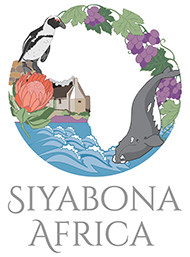Words by Fiona McIntosh
Photographs by Shaen Adey

Table Mountain Activities
Authors: Shaen Adey and Fiona McIntosh.
Copyright © 2004 Struik Publishers Cape Town
The need to create an awareness about the uniqueness of Table Mountain has long been a significant part of the efforts of the management and conservation bodies working on the Cape Peninsula. The Cape Floral Kingdom is the smallest and richest plant kingdom in the world, the only floral kingdom to fall entirely within one country's borders.
Although management strategies have been in place since the days of the early settlers, the need for wood and water resources in particular has resulted in forestation and reservoir building schemes that have had a negative impact on the environment, and in particular, on biodiversity. Education and conservation programmes are therefore vital to secure the future of this unique environment. Much of this work is carried out by volunteers, so, if you want to get involved, there is plenty of opportunity to play an important role.
The Table Mountain National Park (TMNP) co-ordinates many of the volunteer programmes that are active on Table Mountain. Much of this work involves building relationships with private landowners to ensure that habitat conservation and restoration strategies extend throughout the Cape Peninsula.Recently, conservation bodies have placed emphasis on the clearance of alien vegetation and restoring natural biodiversity. It's now been estimated that approximately 6 000 hectares (14 826 acres), or a third of the area managed by the TMNP, has been cleared. Most of this has been achieved by volunteers, but the alien vegetation clearance programme has also created employment for nearly 300 people who have been drawn from historically disadvantaged communities living adjacent to the park.A central part of the programme is the Santam/Cape Argus Ukuvuka Campaign, a joint initiative aimed at combating the threat of wild fires, such as those that destroyed almost 8 370 hectares of vegetation on the Table Mountain chain in January 2000, threatening lives, homes and property. The fires brought home the need to develop an integrated management plan for the control of invasive alien plants, which create a higher risk of fire than indigenous flora.An isiXhosa word meaning 'to wake up', Ukuvuka is funded by the City of Cape Town, national and provincial government and private business. Its non-partisan approach has enabled Ukuvuka to test new, innovative ideas, and to provide a model upon which similar national and international campaigns can be based.In addition to vegetation clearance, the campaign seeks to reduce the risk of fires in the informal settlements found in the Cape Peninsula, particularly those that skirt Table Mountain.In terms of job creation, Ukuvuka has funded the training of residents from previously disadvantaged communities, incorporating them into small business units for clearing alien vegetation - including teams trained in high-altitude clearing. Apart from developing strategic public relations campaigns and facilitating co-operation between the various interest groups, Ukuvuka also encourages state authorities and private landowners to employ these teams to clear their properties effectively.The Ukuvuka campaign has been instrumental in the development of the Cape Peninsula Fire Protection Association (CPFPA), which seeks to unite private landowners to act together to reduce the risk posed by uncontrolled fires. Landowners are encouraged to join their local Fire Protection Association.Volunteers can assist in conserving the Table Mountain chain by joining hack groups and volunteer fire-fighting units, and assisting with environmental programmes. For more information please contact your local Friends group, or the Table Mountain National Park.
